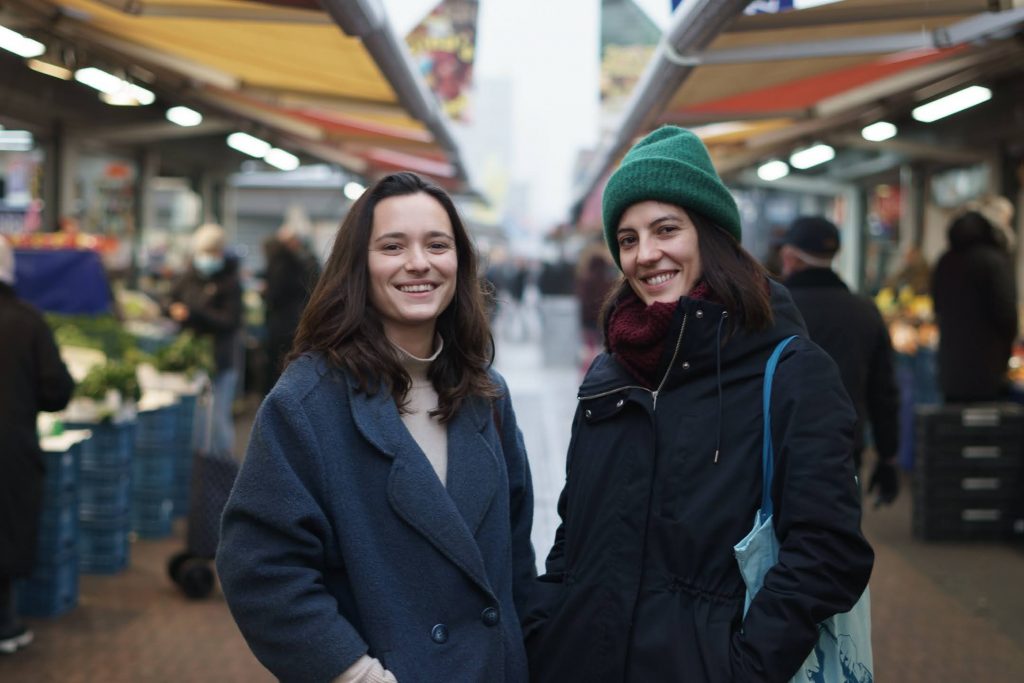‘Start small and ignite that spark’
In one of our streetinterviews, we ran into close friends Susanna and Sofie, ethical foodies who volunteer at Conscious Kitchen. Listen up to their perspective on sustainability in this last “Sustainability Stories from The Hague”, captured by Buro EU end 2020.
Could you please shortly introduce yourself?
Susanna: ‘I am Susanna. I am in the first year of the Master’s in Sustainable Development in Utrecht, living in The Hague. I grew up in Palermo, Italy. Sofie is a close friend of mine that I see almost daily. Together, we are volunteers at “Conscious Kitchen”: an organisation in The Hague that is fighting food waste and organizing dinners with food that would otherwise be thrown away.’
Sofie: ‘And my name is Sofie. My parents are both from Bulgaria and I grew up in Vienna, Austria. I am in the second year of my Master’s in Linguistics in Leiden. Most people would probably think that this is not necessarily sustainability-related, but for me language is the tool to bring the message across.’


What comes to your mind when you think of sustainability?
Susanna: ‘The first word that comes to my mind is sufficiency. I think in general, one of the biggest problems is that we are always trying to think of sustainable ways to produce things so they have less of an environmental impact. But in a way we can also reduce what we produce by simply consuming less.
Sofie: ‘On that note, the first thing that comes to my mind is conscious consumption and actually giving people the knowledge to do this. I think a lot of people just do not know how many resources go into food production, for example one string of tomatoes or one kilo of beef. And similar to the sufficiency mentioned by Susanna is the fact that we do not actually need that much as the capitalist system has led us to believe. We need to change our mindset.’
How can we best change the mindset of people you think?
Sofie: ‘in general, when it comes to changing habits, I think education is very important, that children learn about healthy nutrition at school for example. And this should go hand in hand with making sure the healthy products they learn about, are accessible to them and to their families. For instance, sustainable products often have a higher price. So, in that sense it is good to push for subsidies that support organical, regional and local products.’
Susanna: ‘I agree. How do you get people to switch to those alternatives? A lot of people including myself, as a student, do not have that much money to spend on food. I need to make choices. If environmentally friendly products are subsidized more which means their prices will go down, then people would be keener to buy them.’
What role do you see for national and European politics in this regard?
Susanna: ‘The agricultural policy of the European Union (EU) takes up one third of its budget. So, the EU has massive economic power to push the transition to a more sustainable agriculture system. Think for example, if this money is given on the requirement that food is produced in a more sustainable way that will make a massive and very quick change. This is important because we need to recognize that we are living in a moment of crisis, an emergency situation.’
Sofie: ‘I can only agree. Those who have the power to make a change can make change happen fast. And that in combination with those who are responsible to take responsibility, and to do their best to change their actions in the future.’
Susanna: ‘And talking about agricultural policy, one thing that immediately comes to my mind is the campaign of Fridays for Future. I am following them on Instagram and saw how clear and very straight to the point they communicate: stating facts in visually appealing infographics that were clear and putting across the message in a good way. I think we need more attention on communication about these aspects.’


Sofie: ‘I think this is an excellent point: science communication. There are people who specialize in this and I think there should be more people to bring these very complex topics across to the masses in a nice visual representation on a platform that many people use such as Instagram. I can imagine people feel as if the EU is just this abstract entity that does not affect you personally, but really it does and a better information flow would help.’
Talking about the EU and sustainability: have you heard of the Green Deal?
Sofie: ‘Yes, and my biggest critique would be the lack of communication about it. Of course, all of the information is publicly available, but you have to really look for it yourself.’
Susanna: ‘I have heard of it as well and the criticism that people have about it. Sometimes I feel there is a very strong tendency to point the finger at the EU and always criticize everything they do. But we need to recognize that they operate in a field where they have different influences and pressures around them. It is not that they do not care about the environment, it is just that they have groups pressuring them, lobbying them and then also they have nation states that have their own interests. It is a very complex environment.’
Is there a role for you and me in this complex environment to help them towards a more sustainable direction?
Susanna: ‘If we think of economic power and the interests attached to it, this is probably not going to influence policy in the direction of sustainable living we wish for. So, I think influencing really needs to come from citizens that exert pressure on the state. This is about our safety and living conditions. It is important that also citizens like you and me, are taking responsibility for this because we do have a certain power in that way.’
Sofie: ‘Indeed, exercising your democratic rights to hold your government accountable for what it should be doing. We need to work within the system that is in place and shift the focus towards a more sustainable while keeping in mind that system change is very slow.’


Do you have an example of how you used your democratic rights?
Sofie: ‘We actually went together to one of the big climate marches here in The Hague. It was very motivating when you are part of such a big crowd and you see that everyone around you is fighting for the same cause. And I think peaceful protests like this, do get noticed and talked about.’
Are there other ways in which you contribute to be part of the solution?
Susanna: ‘We recently organized a clothing swap together with a couple of friends. We all brought clothes that are of good quality and in decent shape that we ourselves did not use anymore.’
Sofie: ‘We had clothes racks to display everything and made it into a bit of an event including a fashion and drinks and snacks. It is nice to know that things you do not need anymore will be appreciated by someone else. I think that is also a nice aspect of circularity.’
Susanna: ‘I think it is sort of a mindset you develop, to always try to give a second life to things. This is also something I learned from my parents.
Sofie: ‘And also trying to fix and preserve things, if and where possible, rather than throwing it out and buying something new. And taking better care of things you have in the first place so they last longer.’
You mentioned you are both part of Conscious Kitchen, which means that you act on food as well?
Sofie: ‘I am vegetarian, always, and vegan more and more so. Last January, I embarked on the vegan challenge inspired by Conscious Kitchen because I wanted to try it out for a month to see what happens. The fact that I’m exposed to vegan food through Conscious Kitchen helps. It gives me more ideas of how I can prepare veggies. It made me more creative.’
Susanna: ‘I am not fully vegetarian. I only eat meat when I am eating out for dinner, but at home I never cook it. What made it much easier for me to shift my dietary habits is that one of my flat mates is vegetarian. By eating and cooking together, I got to know so many new recipes and new things I could make. It really never crosses my mind to buy meat at a supermarket because I know the substitutes for it now. I can just eat legumes or leafy greens.’
Next to friends, does your family also influence you?
Sofie: ‘My mom is from a very small village in northwestern Bulgaria, where she grew up on a farm. They just lived off the land and had some animals. You preserve everything you have: you pickle things, you make jams, etc. All this has been the norm for me, and so I have never questioned this way of life. It has always been presented to me as: this is how we do things.’
Susanna: ‘My parents grow their own fruits and vegetables on a plot of land just outside the city they live. They would compost at home and they always eat seasonal food. So, I feel I grew up in a way that showed me how simple these things were. Actually, there are so many low tech and very basic solutions. If I think of my grandma in Italy, she already does many things in a sustainable way. That makes me wonder: why do we need to think so much about technology innovation instead of simply going back and seeing what there is to value in the past.’
Last but not least, are there ways in which you currently help and inspire others to become more sustainable?
Susanna: ‘When talking about recipes and how to cook nice vegan food, check out the website of Conscious Kitchen. There are a lot of recipes there.’
Sofie: ‘Yes, and at Conscious Kitchen we also inspire people by serving them delicious vegan dishes. A lot of people are first surprised and say: ‘Oh my God, this actually tastes great!’ Because people still have misconceptions about veganism and vegetarianism. They often think: ‘What do people eat? Do you eat salad all day?’ I think it is easiest to start sharing and inspiring in your local circle, start small. Even if it’s just the one friend who always cooked in a certain way. Show them how it can be done differently. And igniting that spark as such.’
